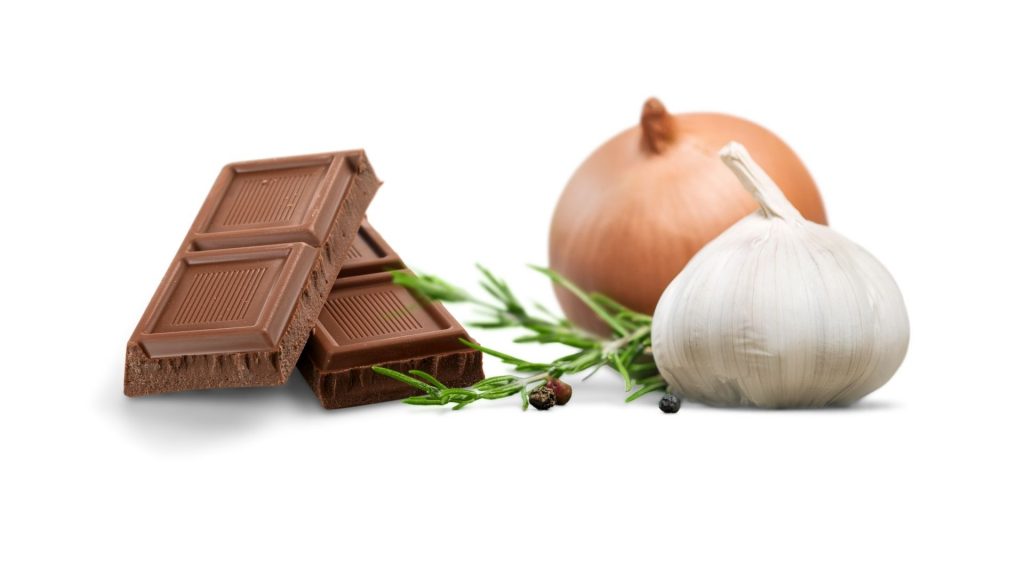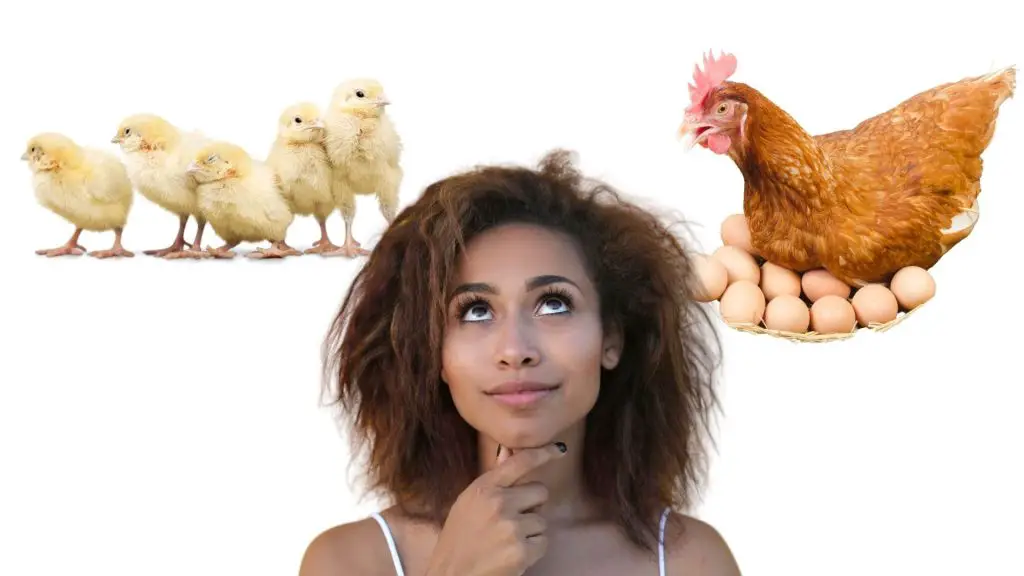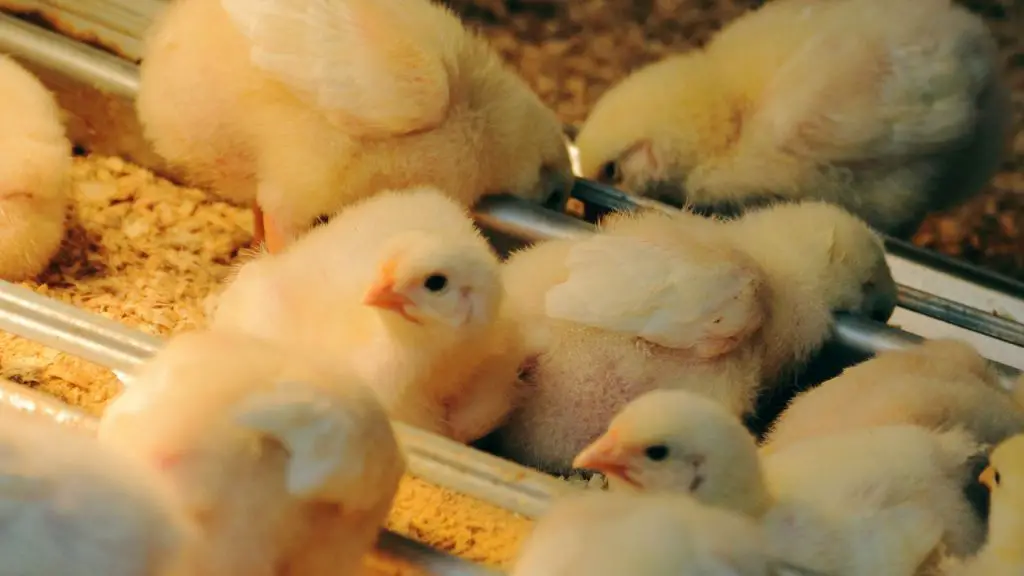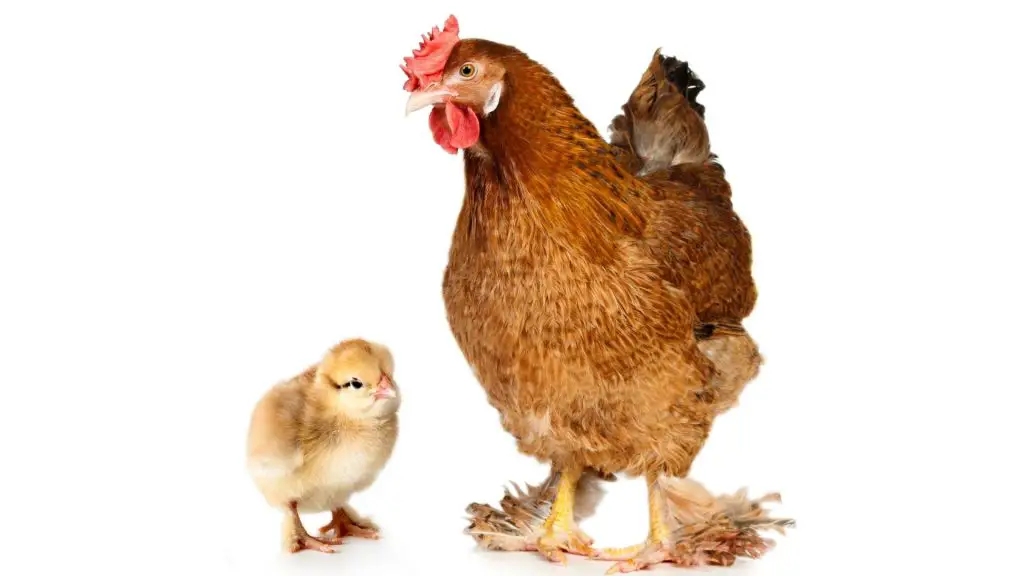Raising baby chicks is a great way to get eggs and build out your animal care skills. You should give your birds the best care possible as babies so you can see the rewards when they’re adults.
What do baby chicks eat? Baby chicks eat many types of small bugs as well as most produce items. Feed baby chicks a consistent diet of balanced chick food with a small grain and high protein to ensure they grow up healthy and strong.
This article will dispel some common misconceptions about chick care and give you the best tips to raise healthy birds.
What Chicks Can and Can’t Eat?

Chicks can eat just as many things as older birds, including most fruits, vegetables, and human-made food items. And there isn’t much food that’s truly dangerous for poultry. Chocolate is a common one advised against, but there aren’t studies to back this claim up.
In general, you should stay away from alliums, aka anything like onions or garlic. These aren’t safe for many different types of animals and can cause significant issues.
The most important thing is the size of what they’re eating.
Should a chick eat something too big for them, it won’t digest it properly and become impacted. Impaction is when something blocks the digestive tract of an animal. It can lead to chronic health issues and even death if it isn’t caught fast enough.
For a high-protein and bird-safe treat, try mealworms! Dried mealworms are a prevalent supplement used in just about every treat blend on the market in the United States. However, mealworms are regulated for food production in Europe for safety reasons.
If you want to give your chickens supplemental food, make sure that all of it hasn’t spoiled. Just like humans, you wouldn’t want to eat food with mold on it, and neither do your birds! Mold can also be a carrier for more severe diseases.
How Long to Feed Chick Starter?

Chicks should feed on chick starter for as long as eight weeks. The starter feed should have at least 20% protein and a blend of other crucial nutrients. Moving chicks up to feed meant for older birds too soon can impede their development.
The first eight weeks of a chick’s life are some of the most crucial. These weeks will make sure your birds grow up to be happy and healthy. The bedrock of their development is what feed you use.
The best chick feed is high in protein and has a dry, mealy texture. This prevents the food from congealing in the digestive tract and impacting. You don’t want a feed that is too powder-heavy or has a grain that’s too fine.
Ideally, it should be a high-protein feed with at least 20% protein. Most commercial chick starters have this level and can be found in stores like Tractor Supply or your local feed store.
If you’re buying your chicks from a breeder, reach out to ask what chick starter they have used with your birds. If you can find the same chick starter, you won’t have to ease the babies onto a new diet and risk indigestion issues that could cause nutrient loss.
What Is the Difference Between Chick Starter and Layer Feed?

Chick starter is specially designed for young birds and gives them the best start. Layer feed has a much higher calcium content, ensuring that eggshells are extra solid and durable. You shouldn’t provide chicks layer feed because they can’t process the extra calcium at the same level as adult birds.
Chick starter has been specially formatted for baby birds who need extra nutrients that older birds can get through their other diet. Like puppy food for dogs, chick starters are engineered to give chicks the best start possible.
Layer feed, on the other hand, is designed to support chickens who are currently laying eggs. They need a higher level of calcium to make stronger eggs. It also gives laying hens extra nutrients that they may be putting into the egg production process.
They also need other supplementary nutrients that they can then put into their eggs. Layer feed is crucial for better production in older hens specifically. As they get older, they start having difficulty producing eggs, especially viable ones.
Giving your chicks layer feed can cause nutritional issues because they can’t process the higher calcium level. Giving older birds chick feed can also deprive them of crucial nutrients and cause them to lay more fragile eggs.
How Long to Feed Medicated Chick Starter?

You should feed chicks medicated chick starter for as long as two weeks to one month. However, if you’re trying to keep your eggs organic, don’t use medicated chick feed at all. The best alternative is maintaining a healthy living space and monitoring your birds closely.
The USDA recommends only feeding medicated starter feed to chicks for two weeks to one month. This will protect them from the parasites and prevent them from being resistant to the medication.
However, if you’re trying to get USDA certified, don’t give your chicks medicated starter feed. This counts as a feed that has been chemically treated and disqualifies your flock. If you’re going to try and become certified organic, you must start from day one and in the first couple months of life.
Is Medicated Chick Feed Bad?
Medicated chick feed isn’t bad nowadays. Previously, potent drugs in medicated feed could render eggs unusable and pose a danger to your flock. New regulations about feed and safety developments have made medicated feed a safe choice for coccidiosis prevention.
These days, medicated chick feed can be a good and healthy option for keeping your birds safer than ever. However, you should look closely at the ingredient list and ensure it doesn’t contain red flag compounds.
Medicated chick feed helps birds build up a tolerance to certain types of diseases like parasites and viruses. This is especially useful if you live in an area where there are high volumes of dangerous conditions.
However, it isn’t necessary for other environments. Chicks can build up their tolerance and immune system to certain diseases. In addition, most hatcheries will vaccinate chicks before they’re sent to the stores for purchase.
Medicated chick feed can be a good supplement for chicks if you’re unsure of their vaccination status. This makes sure that your birds are safe and won’t catch a truly dangerous parasite.
Do Chickens Feed Their Chicks?

Chickens don’t feed their chicks because chicks can forage for their food soon after hatching. Chicks only rely on their mother hen for protection and warmth. Chicks will need to be provided with food separate from hens.
If you’re raising chicks with a hen, you need to provide them with their food in addition to feeding your hens. You should give them a specialized chick feed and other supplements to make sure they grow up healthy and strong. Supplements can be dried insects, grains they don’t get in their regular diet, and fresh produce. All of these will give your chicks the best start possible.
Chicks are dependent on their mothers for protection from other more significant threats, like rodents and snakes. This makes hens much more protective over their young than other birds. They can even become aggressive towards humans if they’re perceived as a threat.
It is important to work with your hens and desensitize them to human contact with their chicks. If they aren’t properly socialized, they can become increasingly aggressive and hurt someone that they see as a threat.
Related: Best Places to Buy Chicken Feed | Must-Read Before You Choose!
List of Sources
Poultry Rations and Feeding Methods
Tipsheet: Organic Poultry Production for Meat and Eggs
Evaluation of Yellow Mealworm Meal as a Protein Feedstuff in the Diet of Broiler Chicks
